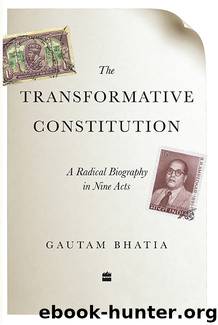The Transformative Constitution by Gautam Bhatia

Author:Gautam Bhatia
Language: eng
Format: epub
Tags: null
Publisher: HarperCollins Publishers India
Published: 2019-09-15T00:00:00+00:00
8
Speech, Association, Personal Liberty, and the State of Exception: Jyoti Chorge v. State of Maharashtra
Freedom of opinion and freedom of association … [are] the two lungs that are absolutely necessary for a man to breathe the oxygen of liberty.
M.K. Gandhi, speech at the 36th Congress Session (1921)
I do not think that it was ever intended that Parliament could, at its will, treat the normal as the abnormal or the rule as the exception.
Justice Fazl Ali (dissenting), A.K. Gopalan v. State of Madras
ON 24 MARCH 2015, in Shreya Singhal v. Union of India,1 the Supreme Court struck down Section 66A of the Information Technology Act. This provision, which criminalized ‘grossly offensive’, ‘annoying’, and ‘inconvenient’ online speech, had been regularly used to target political opposition. In a soaring judgement that dwelt upon the foundational importance of free speech in a pluralist democracy, Justice Rohinton Nariman marshalled half a century of legal precedent to hold that the Constitution’s free speech guarantee allowed advocacy of repugnant or even revolutionary views, and only permitted the State to penalize speech that constituted ‘incitement to violence’.
The Unlawful Activities Prevention Act (UAPA) is India’s umbrella anti-terrorism legislation. Section 2(o)(ii) of the UAPA defines an ‘unlawful activity’ to include anything that ‘disclaims, questions, disrupts or is intended to disrupt the sovereignty and territorial integrity of India’.2 Associations with ‘unlawful activity’ as their object can be banned by the government,3 and members of these associations imprisoned for up to two years.4 There are parallel and more stringent punishments associated with membership of ‘terrorist gangs’.5
How could the jurisprudence of the Supreme Court in Shreya Singhal coexist with a law that criminalizes ‘questioning … the sovereignty of India’, and punishes a concept as fluid as ‘membership’? In Jyoti Chorge v. State of Maharashtra,6 the Bombay High Court held that it could not. Dealing with the bail applications of a group of individuals accused of being members of the banned Communist Party of India (Maoist)—popularly known as Naxals—Justice Abhay Thipsay held that the prosecution’s evidence—that the accused had attended meetings, and were found in possession of literature supporting Naxalism—was insufficient to establish even a prima facie case under the UAPA. The concept of ‘membership’ of unlawful groups and terror gangs did not include passive membership (such as attending meetings, expressing sympathy, and so on), but only active membership, which was limited to incitement to lawless action.
In this manner, Justice Thipsay reconciled the Supreme Court’s free speech jurisprudence with the text of India’s anti-terror legislation. However, just a few months later, another judge of the Bombay High Court rejected the bail applications of individuals who were part of the very same group.7 And Justice Thipsay’s judgement remains an outlier.Not rejected by the Supreme Court, but not endorsed either, it enjoys a curious life in limbo.
In this chapter, I argue that Jyoti Chorge v. State of Maharashtra was a transformative judgement, because it was the clearest and most coherent act of judicial resistance to an almost overwhelming trend in Indian constitutional jurisprudence: the courts’ willingness to uphold and endorse laws that severely curtail civil liberties by citing exceptional situations.
Download
This site does not store any files on its server. We only index and link to content provided by other sites. Please contact the content providers to delete copyright contents if any and email us, we'll remove relevant links or contents immediately.
2010-The City & the City by China Miéville(1968)
Anatomy of Injustice by Raymond Bonner(1649)
That Every Man Be Armed by Stephen P. Halbrook(1569)
ADHD on Trial by Michael Gordon(1565)
Injustices by Ian Millhiser(1486)
You Don't Own Me by Orly Lobel(1434)
Tell by Major Margaret Witt(1429)
Course Correction by Ginny Gilder(1399)
Broken Scales by Joel Cohen(1343)
Without Copyrights by Spoo Robert(1340)
A Vast Conspiracy by Jeffrey Toobin(1320)
First by Evan Thomas(1277)
J by Howard Jacobson(1246)
A Religious Orgy in Tennessee by H.L. Mencken(1240)
The Run of His Life: The People v. O. J. Simpson by Jeffrey Toobin(1195)
A Triumph of Genius: Edwin Land, Polaroid, and the Kodak Patent War by Ronald K. Fierstein(1193)
A History Of Thailand by Baker Chris(1172)
John Wayne Gacy by Judge Sam Amirante(1101)
Law 101: Everything You Need to Know About American Law, Fourth Edition by Jay Feinman(1085)
